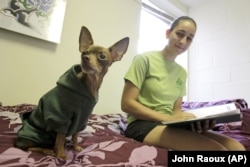Student Union
Colleges and Universities Say Yes to Pets

When new students leave home for college or university, mom and dad aren't the only ones left behind.
Kimberly Brubaker said she didn't want to break the connection she has with family members Dino and Mars: her cat and pet snake.
“If an animal is part of your entire life, and caring for them is a huge part of it, to take that away is pretty dramatic,” she told Associated Press.
So when Brubaker left home to attend Eckerd College in St. Petersburg, Florida, she brought Dino and Mars with her. College officials gave her permission to live with them in a school-owned dormitory.
In the United States, Eckerd is not the only school to accept pets in student housing, but it may have been one of the first. Since the early 1970s, the college has accepted many kinds of animals.
Brubaker heads a student organization that registers pets on campus. It ensures that the animals are well taken care of and that students follow Eckerd’s pet policies. And it tries to solve any disputes.
“We do pet checks once a month — we go around and knock on all the doors,” Brubaker said. The student group receives an average of one or two problem reports each month. But most issues are minor, such as misunderstandings of the rules governing pet registration.

Law students Josh Richey, right, and Lindsay Stewart play with Hooch, a 19-month-old golden retriever and Stanley, a 4-month-old golden retriever, in between final exams at Emory University in Atlanta.
Pets on campus are mostly problem-free and may help their owners and others.
Miranda Goodman-Wilson, an assistant professor of psychology at Eckerd, recently co-authored a study on the effect pets have on students.
Students reported their pets “reduced their levels of stress, and had incredibly favorable things to say about living with the animal,” Goodman-Wilson said. Also, a majority of students claimed that animals were a good influence on their educational performance.
“I think that for many students, having a pet provides a structure that they otherwise lack,” Goodman-Wilson noted. “If you have a dog who has to go out to the bathroom, that’s a powerful alarm clock right there.”
The results of her study were mixed when it came to measuring exactly how helpful pets were for the students’ mental health. She found that students who owned pets did not have lower levels of stress, depression, anxiety or nervousness.
But there was an effect when it came to somatic anxiety — the physical effects of stress, such as a sudden increase in heart rate. Among the pet owners, increased levels of stress did not result in increased somatic anxiety.
“It may be that they are serving as a buffer,” said Goodman-Winslow. “So yes, I’m still having stress, but by having my animal, that stress is not translating into this sort of anxiety in the same way.”

Law student Amelia Myers, 25, is reflected in a book case in the law library as she plays with Hooch, a 19-month-old golden retriever, between final exams at Emory University in Atlanta.
While pets might be good for students, some might worry whether college life is good for the animal. Last year, Mekenna Hooper decided to adopt a dog and said she wanted a small, older dog.
Hooper, who studies at at Johnson & Wales University in Denver, Colorado, said among pet adoption organizations, “none of them liked the fact that we lived in a dorm.” She eventually adopted Max, a seven-kilogram dog who is now 11 years old. Hooper and her roommate attend classes at different times and have different work schedules, so Max is rarely alone more than a few of hours at a time. He also gets all the attention he could ever want in student housing.
“Everyone knows his name,” Hooper noted. “They know his name better than they know ours.”
Goodman-Wilson believes that there can actually be good reasons for bringing your pet to school. The activities of college students can often change from one day to the next, and there are lots of people around them to look in on the pet.
“More so than your typical animal, there are ways for the wellness of the animal to be checked up on,” she said. “And I think students generally are around their animals more than your average working adults.”
If you are looking for an animal-friendly college or university, know that each school has different rules. There are more schools that accept animals kept in small containers than ones that permit dogs or cats. And where dogs are permitted, school officials may set limits on a dog’s breed or size.
Some colleges and universities limit pets to students who have been at the school for more than a year. Even Eckerd only accepts pets that lived with students before they started taking classes.

Emily Rosenfeld, a first-year student at Stetson University in DeLand, Florida, spends time with her Chihuahua, Archie, in her dorm room.
Goodman-Wilson expects the number of pet-friendly schools to grow, partly because of the increase of animals that give emotional support to the owner. Their owners are required to carry a doctor’s note stating that the person needs the animal to help them deal with a mental health condition.
Once policies are in place for emotional support animals in student housing, this can open the door to permitting pets on school grounds, in general.
In a few weeks, Elizabethtown College in Elizabethtown, Pennsylvania, will open its first pet-friendly housing. The college’s new policy grew out of increasing numbers of assistance animals, and because of requests to raise service dogs.
Allison Bridgeman is an administrator with Elizabethtown College. She says that on-campus animals are now seen to have a more general value.
“We see this as part of creating a … campus community that … promotes well-being,” she said.
But it also seems clear that there will be more pet-friendly college campuses as long as students have anything to say about it.
“I answer emails all that time that say, “Hey, I’m trying to start a pet policy on campus, what are the first steps?’” Kimberly Brubaker of Eckerd College said. “I probably get at least one email a week from students at other colleges asking about our program.”
Please visit our Twitter, Facebook, Instagram and LinkedIn for more stories for and about students.
See all News Updates of the Day
- By VOA News
Competition grows for international students eyeing Yale

It’s tough to gain admission to Yale University, and it’s getting even tougher for international students as standout students from around the world set their sights on Yale.
The Yale Dale News, the campus newspaper, takes a look at the situation here.
- By VOA News
Student from Ethiopia says Whitman College culture made it easy to settle in

Ruth Chane, a computer science major from Ethiopia, writes about her experiences settling into student life at Whitman College in the U.S. state of Washington.
"The community at Whitman College made sure I felt welcomed even before I stepped foot on campus," she says.
- By VOA News
Claremont Colleges student gets a shock when she heads home to Shanghai

In The Student Life, the student newspaper for the Claremont Colleges, a consortium of five liberal art colleges and two graduate schools in Claremont, California, student Rochelle Lu writes about readjusting to her Shanghai home after spending a semester in the United States.
- By VOA News
Cedarville University aims to ease transition for international students

Cedarville University in the U.S. state of Ohio says it’s got more than 140 international students representing 44 countries.
Here, the school interviews Jonathan Sutton, director of international student services. He talks about his job and the opportunities for international students on campus.
- By VOA News
Morehouse College offers prospective students tips on applying and thriving

Morehouse College, a private, historically Black liberal arts college in the U.S. state of Georgia, offers a guide for international students interested in attending the school.
Among the tips to apply and thrive at Morehouse:
- Take advantage of the school’s orientation program
- Turn to the school’s Center for Academic Success for tutoring, support and more
- Immerse yourself in campus life via clubs and societies
- By Reuters
US reviews Columbia University contracts, grants over antisemitism allegations

The administration of President Donald Trump said on Monday it will review Columbia University's federal contracts and grants over allegations of antisemitism, which it says the educational institution has shown inaction in tackling.
Rights advocates note rising antisemitism, Islamophobia and anti-Arab bias since U.S. ally Israel's devastating military assault on Gaza began after Palestinian Hamas militants' deadly October 2023 attack.
The Justice Department said a month ago it formed a task force to fight antisemitism. The U.S. Departments of Health and Education and the General Services Administration jointly made the review announcement on Monday.
"The Federal Government's Task Force to Combat Anti-Semitism is considering Stop Work Orders for $51.4 million in contracts between Columbia University and the Federal Government," the joint statement said.
The agencies said no contracting actions had been taken yet.
"The task force will also conduct a comprehensive review of the more than $5 billion in federal grant commitments to Columbia University."
The agencies did not respond to requests for comment on whether there were similar reviews over allegations of Islamophobia and anti-Arab bias.
Columbia had no immediate comment. It previously said it made efforts to tackle antisemitism.
College protests
Trump has signed an executive order to combat antisemitism and pledged to deport non-citizen college students and others who took part in pro-Palestinian protests.
Columbia was at the center of college protests in which demonstrators demanded an end to U.S. support for Israel due to the humanitarian crisis caused by Israel's assault on Gaza. There were allegations of antisemitism and Islamophobia in protests and counter-protests.
During last summer's demonstrations around the country, classes were canceled, some university administrators resigned and student protesters were suspended and arrested.
While the intensity of protests has decreased in recent months, there were some demonstrations last week in New York after the expulsion of two students at Columbia University-affiliated Barnard College and after New York Governor Kathy Hochul ordered the removal of a Palestinian studies job listing at Hunter College.
A third student at Barnard College has since been expelled, this one related to the occupation of the Hamilton Hall building at Columbia last year.
Canada’s immigration overhaul signals global shift in student migration
From Europe to North America, nations are tightening their immigration policies. Now Canada, long seen as one of the world's most welcoming nations, has introduced sweeping changes affecting international students. The reforms highlight a growing global trend toward more restrictive immigration policies. Arzouma Kompaore reports from Calgary.
Trump administration opens antisemitism inquiries at 5 colleges, including Columbia and Berkeley

The Trump administration is opening new investigations into allegations of antisemitism at five U.S. universities including Columbia and the University of California, Berkeley, the Education Department announced Monday.
It's part of President Donald Trump's promise to take a tougher stance against campus antisemitism and deal out harsher penalties than the Biden administration, which settled a flurry of cases with universities in its final weeks. It comes the same day the Justice Department announced a new task force to root out antisemitism on college campuses.
In an order signed last week, Trump called for aggressive action to fight anti-Jewish bias on campuses, including the deportation of foreign students who have participated in pro-Palestinian protests.
Along with Columbia and Berkeley, the department is now investigating the University of Minnesota, Northwestern University and Portland State University. The cases were opened using the department's power to launch its own civil rights reviews, unlike the majority of investigations, which stem from complaints.
Messages seeking comment were left with all five universities.
A statement from the Education Department criticized colleges for tolerating antisemitism after Hamas' Oct. 7, 2023, attack on Israel and a wave of pro-Palestinian protests that followed. It also criticized the Biden administration for negotiating "toothless" resolutions that failed to hold schools accountable.
"Today, the Department is putting universities, colleges, and K-12 schools on notice: this administration will not tolerate continued institutional indifference to the wellbeing of Jewish students on American campuses," said Craig Trainor, the agency's acting assistant secretary for civil rights.
The department didn't provide details about the inquiries or how it decided which schools are being targeted. Presidents of Columbia and Northwestern were among those called to testify on Capitol Hill last year as Republicans sought accountability for allegations of antisemitism. The hearings contributed to the resignation of multiple university presidents, including Columbia's Minouche Shafik.
An October report from House Republicans accused Columbia of failing to punish pro-Palestinian students who took over a campus building, and it called Northwestern's negotiations with student protesters a "stunning capitulation."
House Republicans applauded the new investigations. Representative Tim Walberg, chair of the Education and Workforce Committee, said he was "glad that we finally have an administration who is taking action to protect Jewish students."
Trump's order also calls for a full review of antisemitism complaints filed with the Education Department since Oct. 7, 2023, including pending and resolved cases from the Biden administration. It encourages the Justice Department to take action to enforce civil rights laws.
Last week's order drew backlash from civil rights groups who said it violated First Amendment rights that protect political speech.
The new task force announced Monday includes the Justice and Education departments along with Health and Human Services.
"The Department takes seriously our responsibility to eradicate this hatred wherever it is found," said Leo Terrell, assistant attorney general for civil rights. "The Task Force to Combat Anti-Semitism is the first step in giving life to President Trump's renewed commitment to ending anti-Semitism in our schools."
- By VOA News
STEM, business top subjects for international students

The Times of India breaks down the most popular subjects for international students to study in the U.S.
STEM and business lead the pack. Read the full story here. (January 2025)
- By VOA News
Safety and visa difficulties among misconceptions about US colleges

U.S. News & World report addresses some of the misconceptions about U.S. colleges and universities, including the difficulty of getting a visa.
Read the full story here. (January 2025)
- By VOA News
Work opportunities help draw international students to US schools

US News & World Report details the three top factors in foreign students' decision to study in the U.S. They include research opportunities and the reputation of U.S. degrees. Read the full story here. (December 2024)
- By VOA News
British student talks about her culture shock in Ohio

A British student who did a year abroad at Bowling Green State University in Ohio talks about adjusting to life in America in a TikTok video, Newsweek magazine reports.
Among the biggest surprises? Portion sizes, jaywalking laws and dorm room beds.
Read the full story here. (December 2024)
- By VOA News
Harvard's Chan School tells international students what to expect

Harvard's T.H. Chan School of Public Health reaches out to international students by detailing the international student experience at the school.
Learn more about housing, life in Boston and more here.
- By Reuters
China unveils plan to build 'strong education nation' by 2035

China issued its first national action plan to build a "strong education nation" by 2035, which it said would help coordinate its education development, improve efficiencies in innovation and build a "strong country."
The plan, issued Sunday by the Communist Party's central committee and the State Council, aims to establish a "high quality education system" with accessibility and quality "among the best in the world."
The announcement was made after data on Friday showed China's population fell for a third consecutive year in 2024, with the number of deaths outpacing a slight increase in births, and experts cautioning that the downturn will worsen in the coming years.
High childcare and education costs have been a key factor for many young Chinese opting out of having children, at a time when many face uncertainty over their job prospects amid sluggish economic growth.
"By 2035, an education power will be built," the official Xinhua news agency said, adding that China would explore gradually expanding the scope of free education, increase "high-quality" undergraduate enrolment, expand postgraduate education, and raise the proportion of doctoral students.
The plan aims to promote "healthy growth and all-round development of students," making sure primary and secondary school students have at least two hours of physical activity daily, to effectively control the myopia, or nearsightedness, and obesity rates.
"Popularizing" mental health education and establishing a national student mental health monitoring and early warning system would also be implemented, it said.
It also aims to narrow the gap between urban and rural areas to improve the operating conditions of small-scale rural schools and improve the care system for children with disabilities and those belonging to agricultural migrant populations.
The plan also aims to steadily increase the supply of kindergarten places and the accessibility of preschool education.
- By VOA News
A look at financial aid options for international graduate students in US

The Open Notebook, a site focusing on educating journalists who cover science, has complied a list of U.S. graduate program financial aid information for international students.








